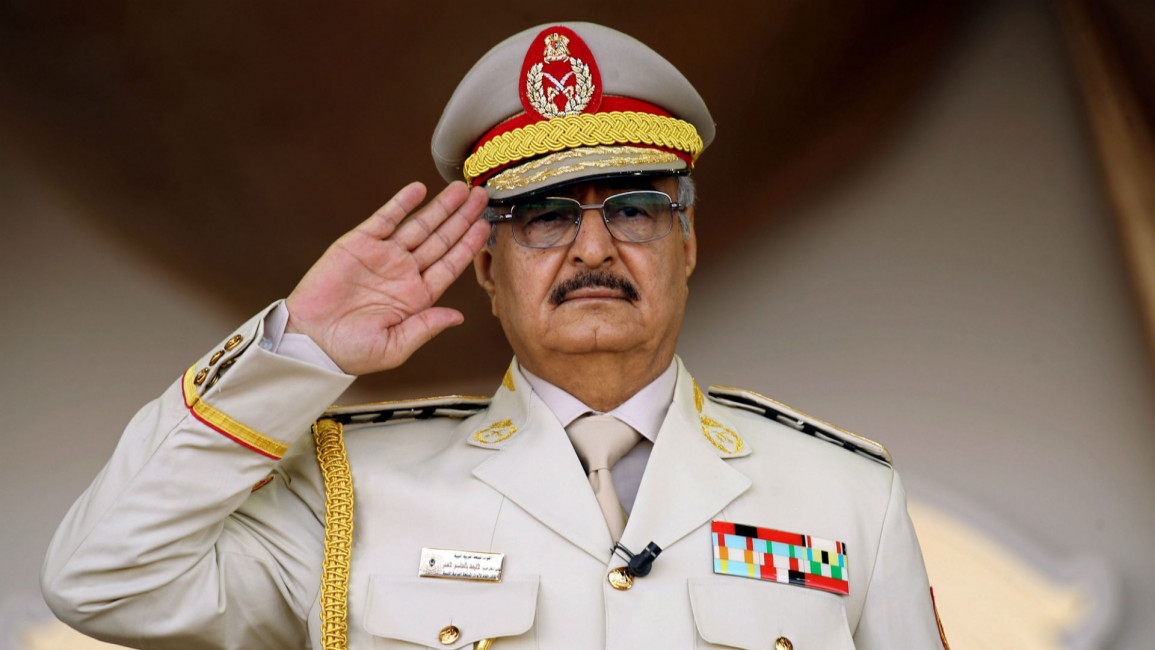UN envoy warns 'handful' of powerful Libyans can block elections
UN envoy warns 'handful' of powerful Libyans can block elections
A UN envoy warned that a "handful" of Libyans were attempting to prevent elections being held in the country later this year.
2 min read
Haftar's rival Libyan National Army dominates the country's east (Getty)
A "handful" of powerful Libyans are ready to do "whatever they can" to block elections from taking place in the north African country, a UN envoy warned the Security Council on Monday.
The United Nations is hoping that presidential and parliamentary elections will be held in Libya later this year, possibly on December 10, to turn the page on years of chaos since the 2011 ouster of Moamer Ghadaffi.
UN envoy Ghassan Salame told the council that without a clear message from world powers to "those who would attempt to stall or disrupt these elections, the conditions will not be met."
"Without the right conditions, it would be unwise to conduct elections," he said.
One million Libyans have registered to vote in the next elections, "however, a handful of people defy this popular desire," said Salame, a former Lebanese culture minister appointed a year ago to lead UN efforts in Libya.
"The few who benefit from the status quo will, if left unchecked, do whatever they can to hinder elections," he warned.
Despite Salame's appeal, the council wrapped up a closed-door session of the meeting without delivering a warning to potential spoilers of the elections.
Swedish Deputy Ambassador Carl Skau, whose country holds the council presidency, said the top UN body must "speak with one voice" and support Salame's efforts.
Libya remains divided between the UN-backed government in Tripoli and a rival administration in the east that enjoys support from Egypt, Russia and the United Arab Emirates.
Salame's warning came just two months after rival Libyan leaders agreed during a meeting in Paris to hold elections on December 10 and to abide by the outcome of the vote.
The Paris meeting brought together for the first time Prime Minister Fayez al-Sarraj, head of the UN-backed government in Tripoli, and military strongman Khalifa Haftar, whose rival Libyan National Army dominates the country's east.
Also present were Aguila Saleh Issa, the parliament speaker based in the eastern city of Tobruk, and Khalid Al-Mishri, the head of the High Council of State.
In his report to the council, Salame accused the Tobruk-based House of Representatives of delaying a vote on electoral legislation and said he hoped for action in the coming weeks.
"The status quo in Libya cannot be sustained. The country is in fact, in decline," warned Salame.
Without progress, Libya will face "economic collapse, the breakdown of public services, and more frequent and intense outbreaks of violence," he added.
The United Nations is hoping that presidential and parliamentary elections will be held in Libya later this year, possibly on December 10, to turn the page on years of chaos since the 2011 ouster of Moamer Ghadaffi.
UN envoy Ghassan Salame told the council that without a clear message from world powers to "those who would attempt to stall or disrupt these elections, the conditions will not be met."
"Without the right conditions, it would be unwise to conduct elections," he said.
One million Libyans have registered to vote in the next elections, "however, a handful of people defy this popular desire," said Salame, a former Lebanese culture minister appointed a year ago to lead UN efforts in Libya.
"The few who benefit from the status quo will, if left unchecked, do whatever they can to hinder elections," he warned.
Despite Salame's appeal, the council wrapped up a closed-door session of the meeting without delivering a warning to potential spoilers of the elections.
Swedish Deputy Ambassador Carl Skau, whose country holds the council presidency, said the top UN body must "speak with one voice" and support Salame's efforts.
Libya remains divided between the UN-backed government in Tripoli and a rival administration in the east that enjoys support from Egypt, Russia and the United Arab Emirates.
Salame's warning came just two months after rival Libyan leaders agreed during a meeting in Paris to hold elections on December 10 and to abide by the outcome of the vote.
The Paris meeting brought together for the first time Prime Minister Fayez al-Sarraj, head of the UN-backed government in Tripoli, and military strongman Khalifa Haftar, whose rival Libyan National Army dominates the country's east.
Also present were Aguila Saleh Issa, the parliament speaker based in the eastern city of Tobruk, and Khalid Al-Mishri, the head of the High Council of State.
In his report to the council, Salame accused the Tobruk-based House of Representatives of delaying a vote on electoral legislation and said he hoped for action in the coming weeks.
"The status quo in Libya cannot be sustained. The country is in fact, in decline," warned Salame.
Without progress, Libya will face "economic collapse, the breakdown of public services, and more frequent and intense outbreaks of violence," he added.



